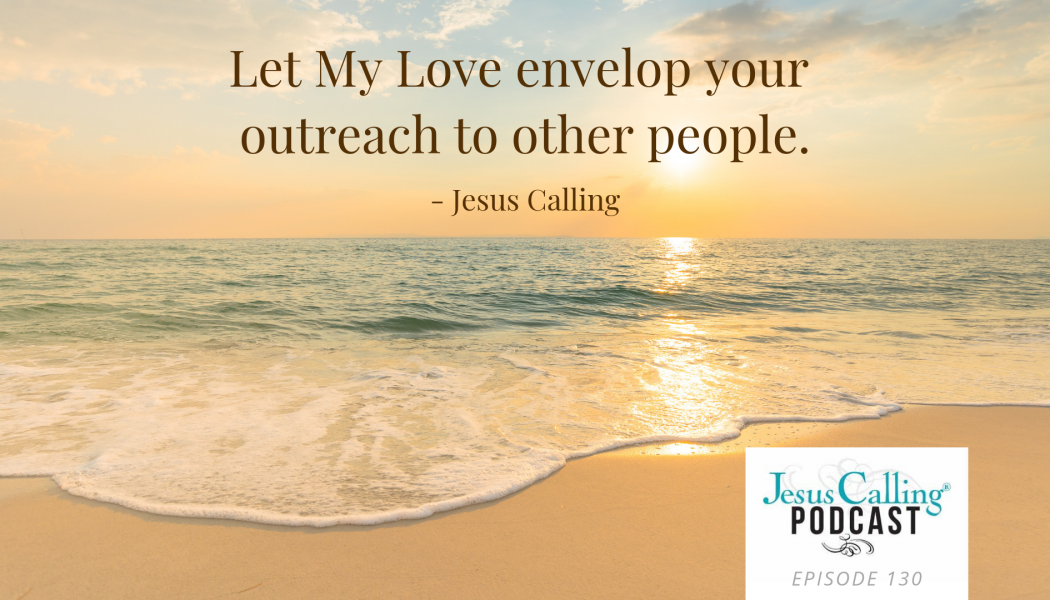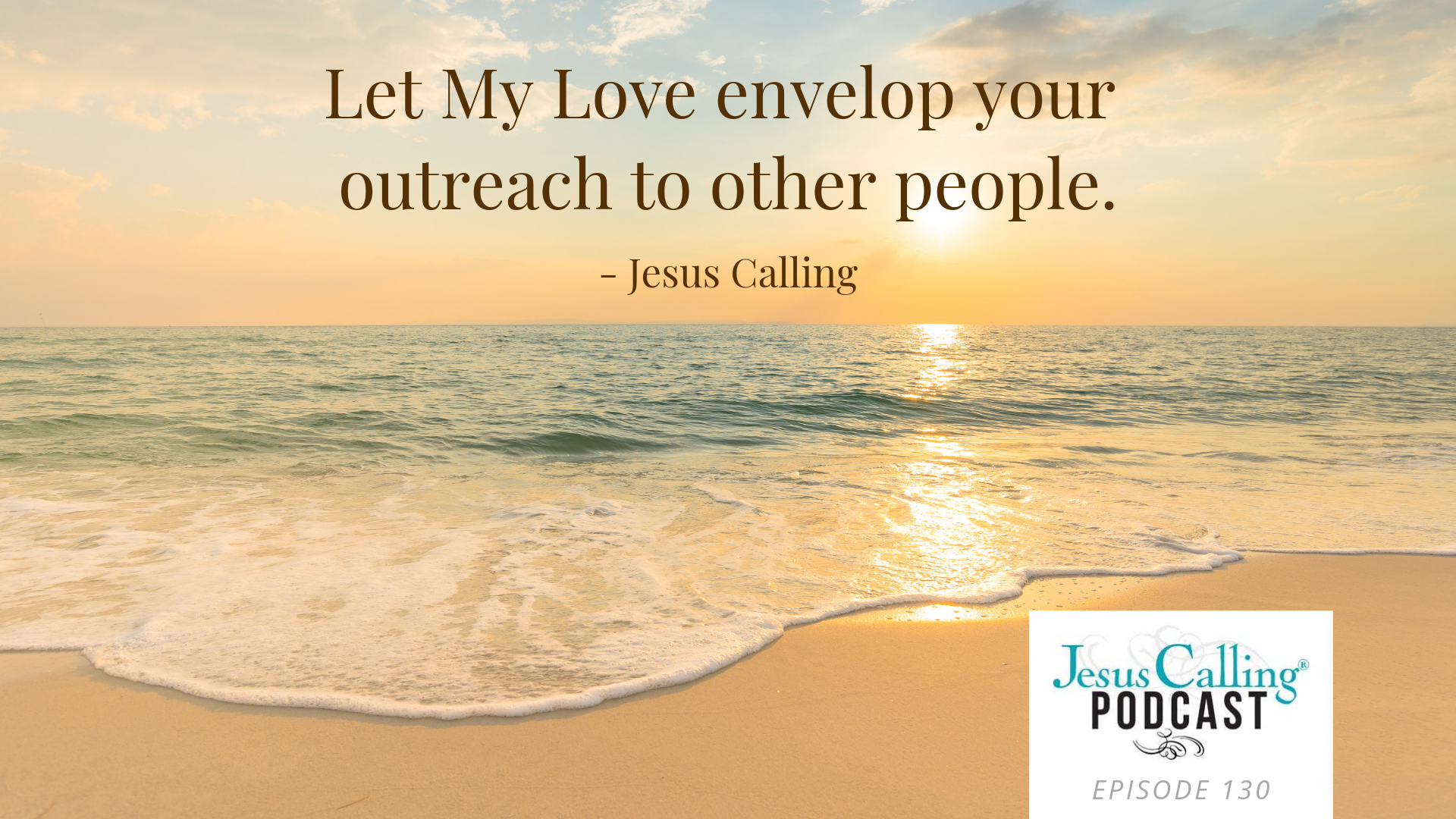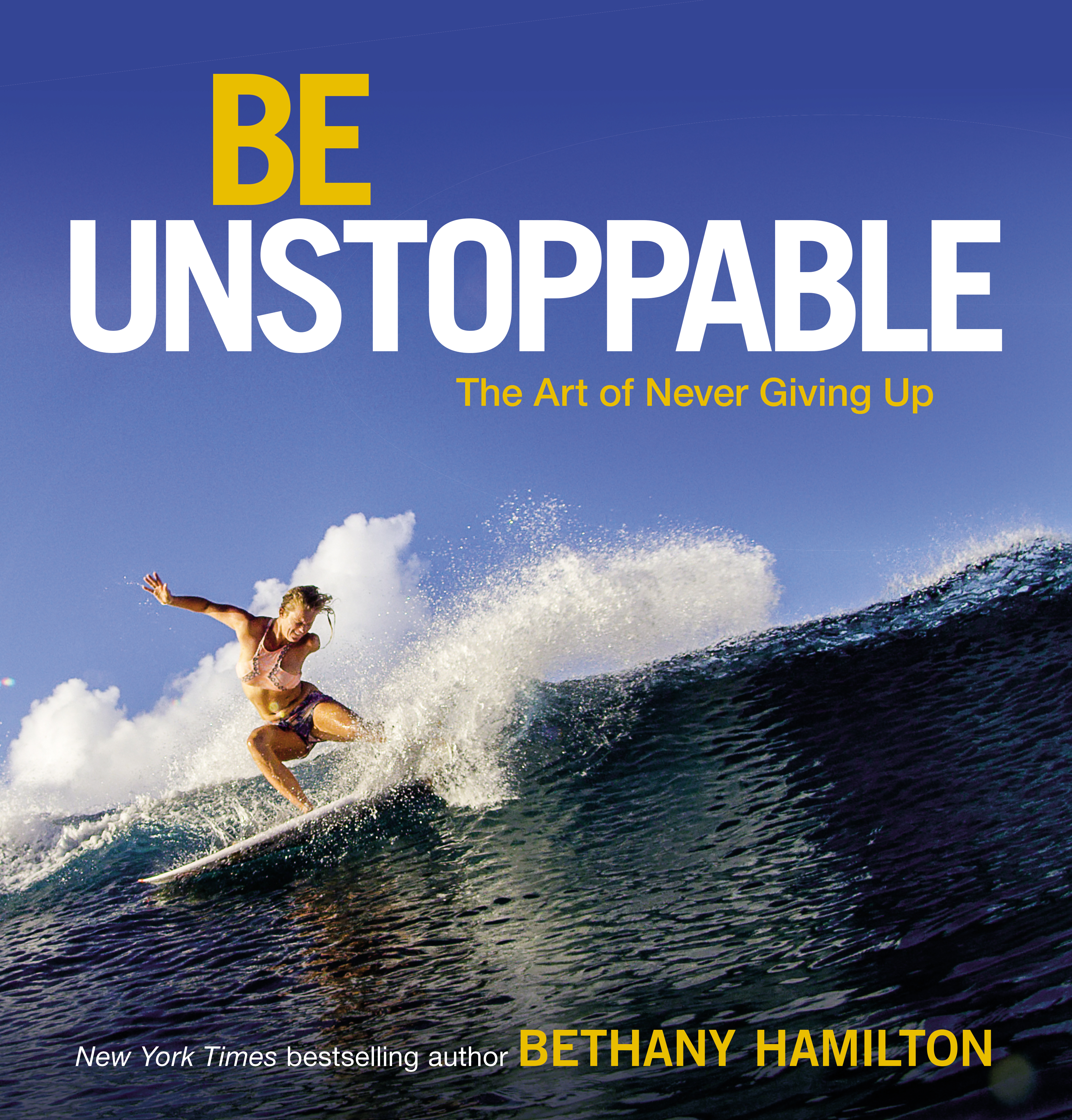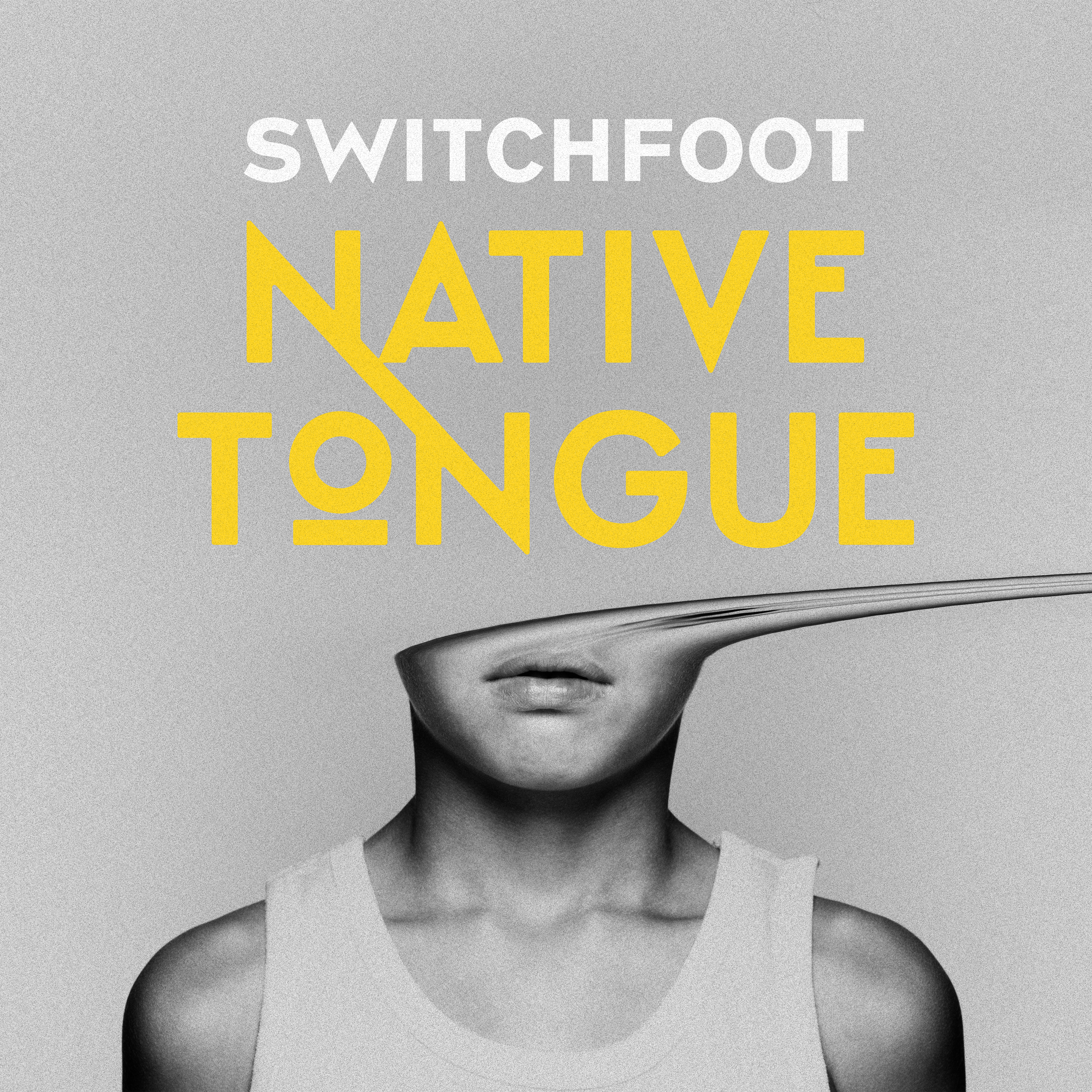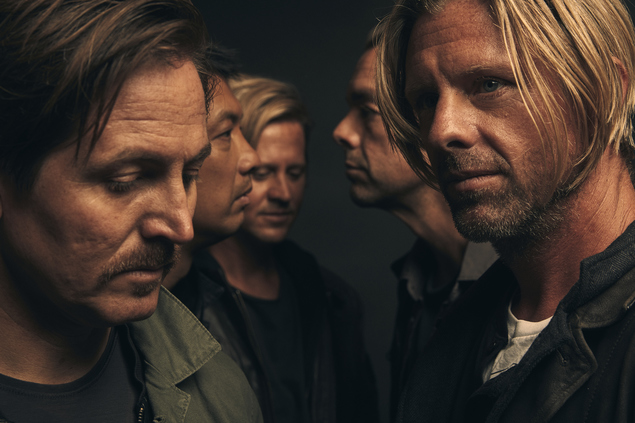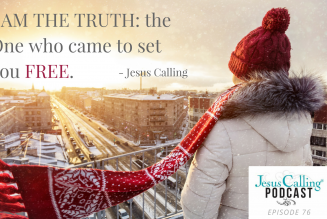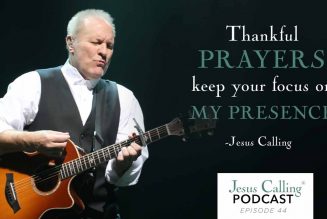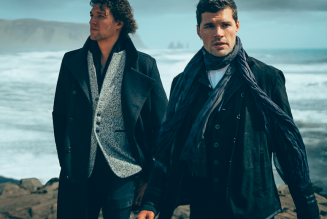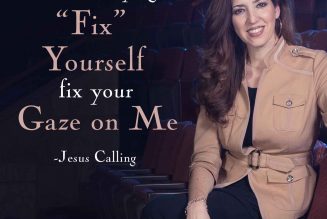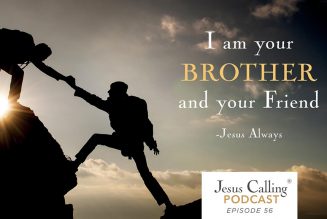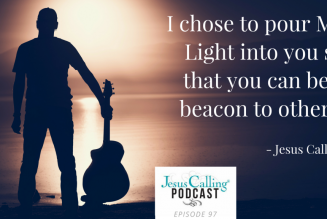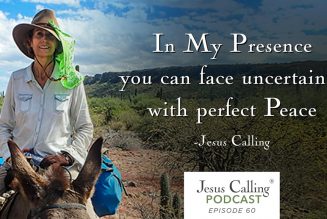Surfer Bethany Hamilton and Switchfoot frontman Jon Foreman both believe that by being open to others with their experiences, whether triumphant or tragic, God can use them to have a mighty impact. First up, A surfing prodigy at just 13 years old, Bethany Hamilton’s future in the sport looked promising, but in one tragic incident, her life was changed by a shark attack that resulted in the loss of her left arm. With faith and courage, she refused to be a victim, and her story of survival and her return to competitive surfing has inspired millions. Today Bethany tells us how her faith carried her through her darkest days, and about her reluctance to share her story until a sudden realization changed her mind. For more than 20 years, GRAMMY-winning recording artist Jon Foreman has been the lead singer of the alternative band Switchfoot, inspiring legions of fans across the world with guitar riffs and contemplative lyrics in songs like “Dare You to Move” and “Meant to Live.” Jon tells us about the band’s earliest days and the story behind their breakout moment when their music was featured in the movie A Walk to Remember. He shares about the band’s new album Native Tongue, and why they blur the lines between secular and sacred as they try to reach a broad audience with Christ’s love and life-giving purpose.
Bethany Hamilton: God’s promises are the same yesterday, today, and forever. We can hold fast to His truth and His Word, no matter what we’re going through, and we can be unstoppable through Jesus.
Reflecting Our Maker’s Love: Surfer Bethany Hamilton and Switchfoot’s Jon Foreman – Episode #130
Narrator: Welcome to the Jesus Calling Podcast. Today’s guests both believe that by being open to others with their experiences, whether triumphant or tragic, God can use them to have a mighty impact: professional surfer and author Bethany Hamilton, and Switchfoot frontman Jon Foreman.
First up, Bethany Hamilton grew up in the Hawaiian islands, spending her days on a surfboard before she could even walk. A surfing prodigy at just 13 years old, Bethany’s future in the sport looked promising, but in one tragic incident, her life was changed by a shark attack that resulted in the loss of her left arm. With faith and courage, she refused to be a victim, and her story of survival and her return to competitive surfing has inspired millions. Today Bethany tells us how her faith carried her through her darkest days, and about her reluctance to share her story until a sudden realization changed her mind.
 Bethany Hamilton: Hey, everyone, it’s Bethany here. I’m born and raised in Hawaii, and I’ve grown up to be a surfer. Now I’m a surfer and so much more: I’m a wife, a mom, an author, a motivational speaker.
Bethany Hamilton: Hey, everyone, it’s Bethany here. I’m born and raised in Hawaii, and I’ve grown up to be a surfer. Now I’m a surfer and so much more: I’m a wife, a mom, an author, a motivational speaker.
Parents Who Shared Faith and Surfing
Growing up my whole family surfed, Mom and Dad and two older brothers. I definitely was hooked at a young age. They had me on the board before I could walk.
I started competing at age 5. In Hawaii, they have surf contests for kids, and it’s called the Keiki division, which keiki is “kid” in Hawaiian. That division is one parent pushes you in, and the other parent catches you on the shore. So it’s just the ultimate fun event, not really competitive. You’re just out there having fun with other kids and your mom and dad pushing you in and catching you and getting you back out there.
But I think around seven or eight was when I really started asking all the time, like, “Take me surfing! Take Me surfing!”
I think around the same time, I was seeing the older professional surfers in my local community. I was like, Wow, I want to surf for a living. And so I set my hopes on being the best surfer I could be in women’s surfing.
My mom and dad became Christians in the 70s after they got married, and they kind of shared the two biggest passions with us: their faith in God and surfing. And that’s what we kind of surrounded our life around. So at a young age I became a Christian.
I feel really thankful for how my mom and dad both encouraged me in my faith, and especially my mom. She would always read the Bible with me and pray with me a lot growing up. And I can remember before I lost my arm to the shark, my mom and I had been praying over my surfing. Actually we were like, “Lord, as much as we love surfing, please let our lives be more than just about surf, and let it honor and glorify you.”
“Lord, as much as we love surfing, please let our lives be more than just about surf, and let it honor and glorify you.” – Bethany Hamilton
It was kind of a very specific prayer that we had been praying. It really gave me the mindset of, like, life’s not all about surfing. Which as a kid, you can get very enamored with the ocean and having fun and playing, you know. But it was a good reminder that, “Hey, let’s pray and ask God to make life more than just having fun.”
“It’s going to be okay. You have a plan for my life.”
Narrator: Bethany’s talent for surfing soared as she grew older. One morning in 2003, 13-year-old Bethany went surfing with her best friend and her family. As she was laying on her surfboard, a shark attacked her. Through the grace of God, Bethany survived the attack but lost her left arm.

Bethany Hamilton: When I lost my arm I was like, Okay, God, what are you up to?
I think because I had a relationship with God and because I had a young faith, I was like, Okay, well, God’s in control. It’s going to be okay. And You have a plan for my life, so let’s just keep on moving forward.
I think I was just kind of in the moment, thinking and praying, asking God to get me through it. But I don’t know if I was really thinking, I’m going to die, or, I’m going to live. It was just more like survival mode. But yeah, I’m thankful that I made it through that day. And definitely the week following, I had a unique sense of peace.
I feel like you could be in that same situation, and be very frantic and distraught and like, “Life’s over,” depressed and really down. But I definitely have the peace of God in my life.
I just knew that something good was going to come out of it, and I may not have been able to speak those words at that time. But I think that was kind of like the sense of feeling that I had. I trusted that God was getting us through this. I mean, the fact that I lived too . . . I remember my mom’s first words were like, “I’m so thankful you’re alive. Just be thankful that you’re alive because you could be gone now.”
And so I think that was a good starting point of our mindset. I definitely did not let fear control my life. I think of like when I first started to re-learn how to surf. I was a very determined optimistic young woman.
After I stood up on my first wave, there was like no looking back. Like, I’m doing this with one arm, and nobody is going to stop me. I don’t care what they think or say because this is what I’m going to do.
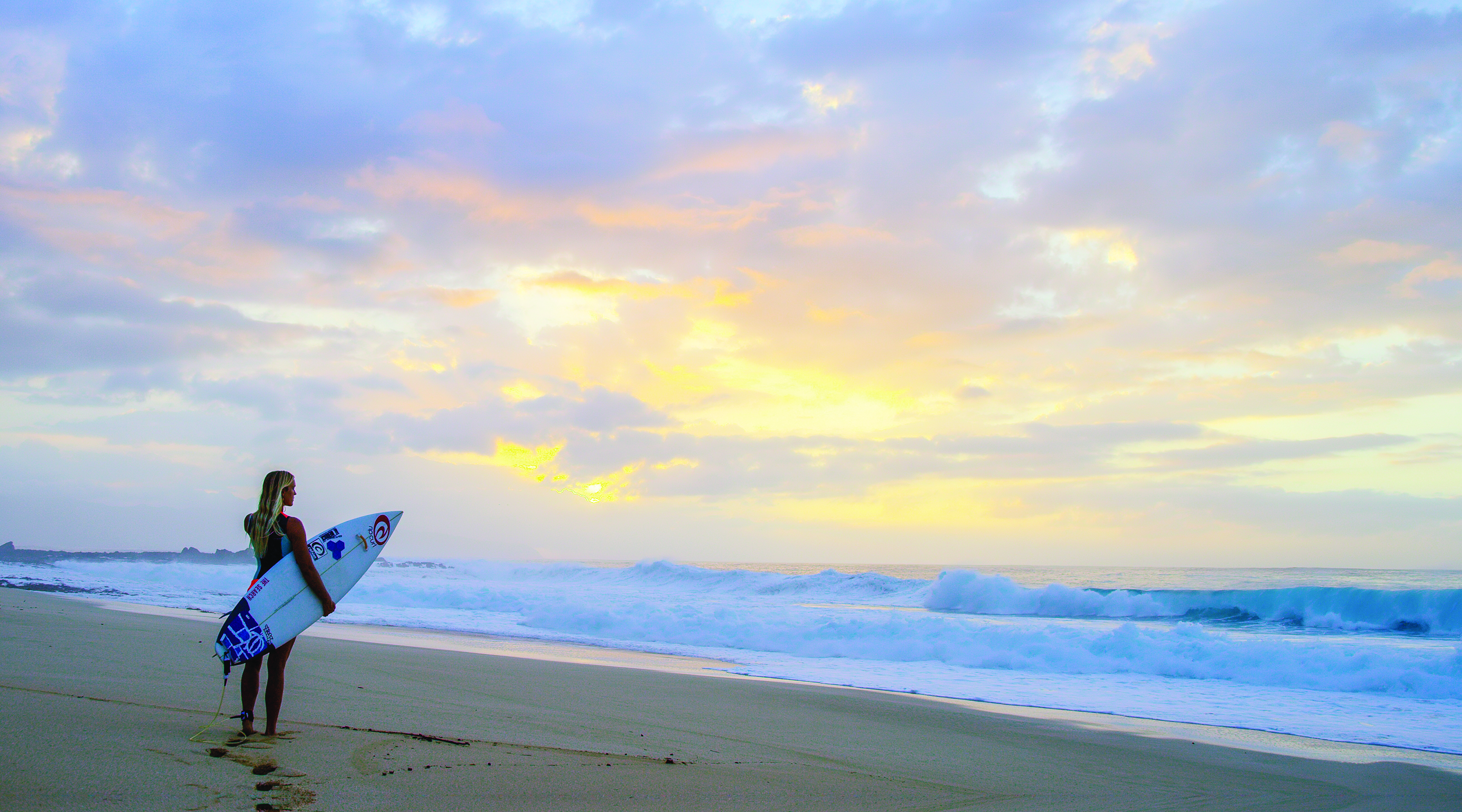
Showing God’s Story to Others
Growing up in Hawaii, I lived in a really small town where everyone knows everyone. And then all of a sudden, I’m like world news. So yeah, it was daunting.
I didn’t really appreciate having a lot of attention on me. And once I started doing interviews at the age of 13, all I wanted to do is be with my friends playing and be outside, doing what normal kids do. But I was getting on an airplane to go do a bunch of interviews and talk about a bad day over and over again. So it was pretty kind of awful at first, and it took a long time for me to adjust to that and adjust to that tension. But once I started to see that encouragement and inspiration that was being put on other people’s lives by telling my story, I realized, Okay, God, this is what you’re up to. You want to show me Your story more than You want to share mine.
“Okay, God, this is what you’re up to. You want to show me Your story more than You want to share mine.” – Bethany Hamilton
I have a big passion for encouraging other people. So I started doing motivational speaking, which I love doing that now.
I like being able to share my story and I see the value of like that’s how we as humans can relate to each other, by sharing our hard times, but we also share are good times. But really sharing in our hard times and like encouraging each other to the challenges of this world.
Now being a mom of two, my husband and I read books to our kids a lot. You find your books that you love and find books that you don’t love as much. So we were like, “Hey, let’s write a fun kids surfing book!”
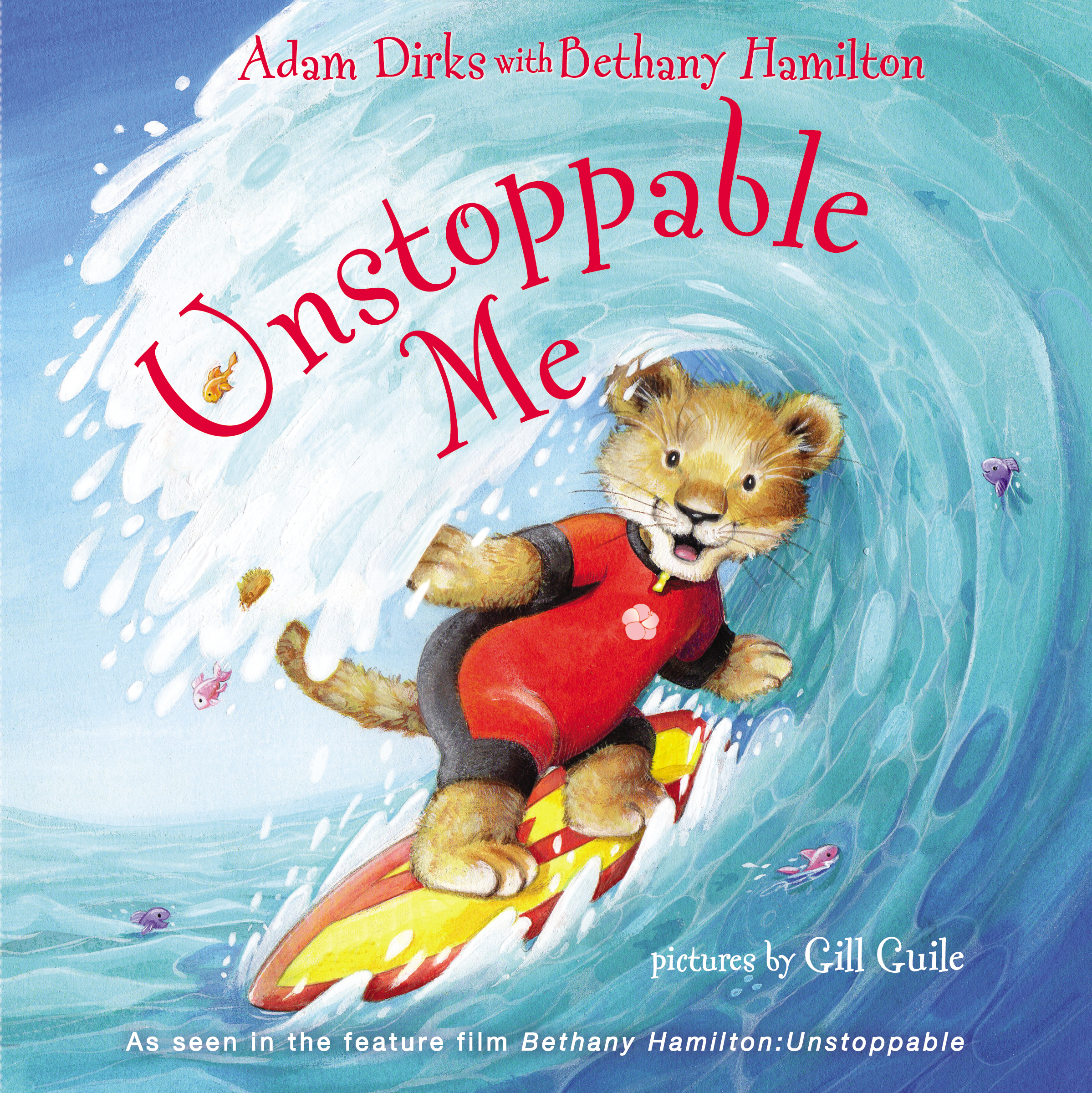 Unstoppable Me was the first book that we’d decided on writing. And it had the theme of being unstoppable, [which is] just a good message for the kiddos and something that we’d be stoked to read to our own kids. My husband did the majority of the writing for that and decided to do Be Unstoppable too, which is to me, it’s kind of more of like a coffee table book. You can throw it on your coffee table and open up a random page, and hopefully you get a hint of inspiration for your day or life. It follows the making of our documentary that’s called Unstoppable Bethany Hamilton, and it’s a documentary kind of capturing my life story.
Unstoppable Me was the first book that we’d decided on writing. And it had the theme of being unstoppable, [which is] just a good message for the kiddos and something that we’d be stoked to read to our own kids. My husband did the majority of the writing for that and decided to do Be Unstoppable too, which is to me, it’s kind of more of like a coffee table book. You can throw it on your coffee table and open up a random page, and hopefully you get a hint of inspiration for your day or life. It follows the making of our documentary that’s called Unstoppable Bethany Hamilton, and it’s a documentary kind of capturing my life story.
[embedded content]
Narrator: Bethany also started a nonprofit organization called Friends of Bethany, which aims to spread the love and hope of Jesus by helping shark attack survivors and people with limb differences. She goes on to describe one of her favorite events the foundation hosts—an annual retreat for women with limb differences.
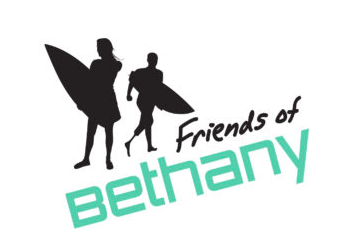
Bethany Hamilton: We originally started the foundation to reach out to shark attack survivors and their families and encourage them in that time, and also people losing limbs, which is way more in common though we know. It’s like an everyday thing.
It’s a tight knit small retreat of like just 20 or so girls who all have limb differences and just a time of encouraging them through their journey and uplifting them in their faith. Not all the girls are Christians, but we hope to share the faith of God, our faith of God with them. And it’s seriously the most amazing weekend.
We take all the girls surfing, and we have a lot of sit down times of talking and make a really open environment. And for a lot of these girls, they hardly talk to other amputees, and so they’re all the sudden surrounded by all these women [who have] faced similar circumstances to them and are able they just open up and talk about life’s challenges and talk about how we overcome. It’s literally the most awesome weekend.
Seeing God’s Love Through Family
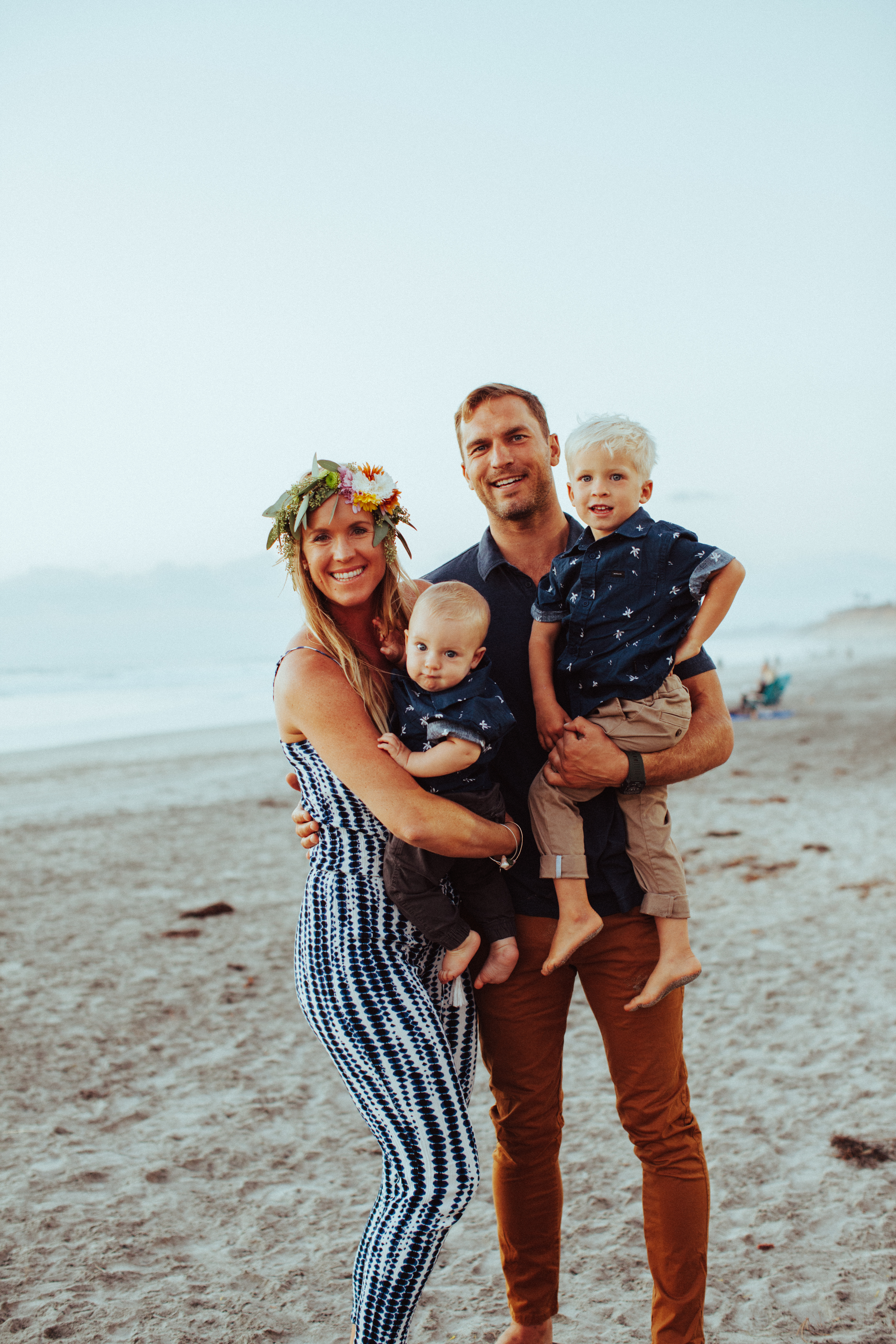 There are definitely things I feel so thankful for, and how my parents raised me and just keeping things really simple. They didn’t have a lot of money, and so they made life work in such a great way and it just kept things simple. We spent a lot of time at the beach, and they encouraged me and my faith. Honestly, that’s what I want to do with my kids: spend a lot of time at the beach and encourage them and their faith in God and just guide them along the best they can.
There are definitely things I feel so thankful for, and how my parents raised me and just keeping things really simple. They didn’t have a lot of money, and so they made life work in such a great way and it just kept things simple. We spent a lot of time at the beach, and they encouraged me and my faith. Honestly, that’s what I want to do with my kids: spend a lot of time at the beach and encourage them and their faith in God and just guide them along the best they can.
Motherhood has definitely been such a beautiful journey so far. You can definitely get the sense of God’s love for us [by] how you just love your kids so much that you would do anything for them as far as dying for them. That probably only touches the surface of how much God loves us, His Son dying on the cross for our sins and bringing us forgiveness, Him overcoming sin and death for our forgiveness and giving us life.
“[My motherhood journey] probably only touches the surface of how much God loves us, His Son dying on the cross for our sins and bringing us forgiveness, Him overcoming sin and death for our forgiveness and giving us life.” – Bethany Hamilton
Now I feel like our culture is such like a rat race, and everybody’s so, “Go go go.” Definitely, we’re in a busy time in our lives, but I’m hoping at some point we’ll just have a little less “go go go” and kind of keep it a little more simple.
I’ve had a lot of different challenges in my life but I’m thankful that the most important part of my life is being Christian and relying on Christ for my strength and my faith. I look back and I really believe that God gave me the passion that I have for the ocean for a reason.
And the rest is kind of history.
Narrator: To learn more about Bethany and her latest book Be Unstoppable: The Art of Never Giving Up, please visit BethanyHamilton.com.
Narrator: Stay tuned for our chat with Switchfoot frontman Jon Foreman after a brief message about a beautiful new edition of Jesus Calling!
Narrator: Are you looking to introduce a friend or loved one to the peace that can be found by spending time with God daily? There’s a beautiful new edition of Jesus Calling that makes a gorgeous gift for someone who might be seeking a new perspective for a new year. It’s the same Jesus Calling daily devotional that has inspired over 25 million readers, now updated with a lovely fabric cover and eye-catching foil with feminine floral touches. This elegant new version also features large text and written-out scripture verses with each passage.
For more information about this stunning new edition of Jesus Calling, visit JesusCalling.com/Botanical. That’s JesusCalling.com/botanical. Now, let’s get back to the second half of our program.
Narrator: Our next guest is GRAMMY-winning recording artist Jon Foreman. For more than 20 years, Jon has been the lead singer of the alternative band Switchfoot, inspiring legions of fans across the world with guitar riffs and contemplative lyrics in songs like “Dare You to Move” and “Meant to Live.” Jon tells us about the band’s earliest days and the story behind their breakout moment when their music was featured in the movie A Walk to Remember. He shares about the band’s new album Native Tongue, and why they blur the lines between secular and sacred as they try to reach a broad audience with Christ’s love and life-giving purpose.
 Jon Foreman: My name is Jon Foreman, and I write songs. I’m in a band called Switchfoot. Proud and honored to be in a band with those guys for 20 years
Jon Foreman: My name is Jon Foreman, and I write songs. I’m in a band called Switchfoot. Proud and honored to be in a band with those guys for 20 years
I have three goals. The first goal is to be a good husband. The second is to be a good father. Seeing my kids that seeing them shine. That’s worth way more than any GRAMMY or anything we’ve won. And then the third is to reflect and receive the light and love of my Maker.
Growing Up in a House with Zeppelin and Bach
Music has always been a part of my life.
For me and my family, there was always music around, from Keith Green to Aretha Franklin to The Beatles. And then I got into [Led] Zeppelin. My dad played more of that rock ‘n’ roll tunes, The Doors and everything like that, coming from California and then. My mom loves Bach. So somewhere between, we grew up with all of that.
There was always a guitar lying around, the piano was fair game always, pots and pans. And so I don’t think there was ever a time where I wasn’t immersed in music as a kid.
When you’re in junior high, there’s all sorts of things that are happening where you are . . . you can dream anything up, right? My friend was in a Led Zeppelin cover band, which I think they had like one or two songs they had learned. They needed a guitar player and a bass player, so me and my brother jumped in. I played the guitar my brother played the bass.
That was our that was our childhood. We played a pool parties. That was the only game we ever played as a band. I remember we’re we call ourselves “Joker’s Wild.” And I remember we got through the set, and it was awful because my friend had borrowed a huge white Warlock guitar and changed the strings on it. And none of us really knew how to change strings at the time and didn’t know you had to stretch them out. So the entire set was horribly out of tune. I think it was like two or three four songs, maybe. Then the older kids at the party, who were actually pretty good at guitar, jumped in and showed us how it is done. So that was our first show ever.
Realizing We All Need Our Maker’s Love
Kierkegaard was right about many things, including his delineation between the church and Christendom. He articulated the idea that, yes, the church is the church. But the trappings and trimmings of what we call “Christian” aren’t necessarily the body of Christ and the vernacular we use, what we call “Christian art”—the buildings, all of it, the particular laws and and rules and unspoken regulations that we all abide by—aren’t a part of who Christ is and often are less gracious than they could be to you, to put it kindly. And you travel around the world and you realize, Wow. So there’s a million different ways to embrace the sacrificial love of Christ.
“There’s a million different ways to embrace the sacrificial love of Christ.” – Jon Foreman
So growing up in the church as a church kid, my dad’s a pastor. I had a very interesting upbringing where my dad didn’t delineate that schism for me between sacred and secular. And that was spelled out in a million ways, but he taught Me “Stairway to Heaven.” He embraced what I was into. He went surfing with me. There was not something that was, “Oh, this is our Christian time, and this is this is our mainstream time.” Because I think the moment you live that out, you’re living out a dualistic life. You’re living out this identity that cannot actually exist because all of us only have one soul and one mind, one body, one life to live. So trying to live [as] two different people, that’s going to break. Something’s going to shatter along the way.
“Trying to live [as] two different people, that’s going to break. Something’s going to shatter along the way.” – Jon Foreman
I went to [University of California San Diego] because it’s a great school. All my friends were atheist, agnostic. I was like the token Christian kid that they knew. And I feel like that was a beautiful thing, because suddenly you are the sole representative of Christ. And then there’s this beautiful pressure to actually live out what you believe. Whereas I think in the Christian bubble, many of us don’t have that pressure. We don’t feel the pressure to actually do what we believe in, and we run from it in a strange way.
There is no “we/they.” It’s “I am you/you are me.” We are all in need of a beautiful, self-sacrificial love. That we’ve been offered through our Maker. That’s who I’m singing for.
“We are all in need of a beautiful, self-sacrificial love. That we’ve been offered through our Maker. That’s who I’m singing for.” – Jon Foreman
A Breakout Moment through A Walk to Remember
Narrator: Jon and his brother Tim, along with their friend Chad Butler, eventually began a band they called Switchfoot in 1996. The group started building a following. And in 2002, they shot to mainstream fame when their music was selected for the film adaptation of the Nicholas Sparks novel, A Walk to Remember, starring Mandy Moore, thanks to a friend from high school who worked for the music producer for the movie.
Jon Foreman: [My friend said to the music producer], “I have these friends from high school. They have this song that you would love. You have to hear it. It’s perfect for the movie,” and played him “Only Hope.” Now it’s the first time she’d ever played him any songs, and it happened to be ours. It was a random thing because I hadn’t talked to this friend of mine in years, and we were the last thing from Hollywood, you know. I mean, San Diego was fairly close, two hours away, but it couldn’t be more polar opposite, you know, the culture. And so it was really enjoyable to go up there and find this group of people that were genuinely soulful people in a place like Hollywood.
I think that was a shock for me was, Oh my gosh, there are humans up here that are truly good humans, that really are wonderful people that love good music and are willing to have incredible spiritual conversations. That was my preconception, my prejudice of just kind of being anti-Hollywood, anti-L.A. and having to first and foremost be humbled and say, Wow, okay, so there’s good everywhere. And potentially the Maker has a bigger plan than what I dream up.
I walked the red carpet for A Walk to Remember. I’ll never forget walking with Tim and Chad and everyone saying, “Who are you?”
Living a Story Beyond Yourself
Narrator: Jon is a prolific artist who has been writing songs for more than twenty years. He reveals secrets to his songwriting success and why the creative process for Switchfoot’s latest album, Native Tongue, is different from any other they’ve ever done.
Jon Foreman: I feel like there is a certain tension that has to exist in all of our lives—the guitar string only makes music while it’s stretched tight. So I think we as humans are best when we are in uncomfortable spots, when we’re stretched a little tight. And for me as an artist, first as a songwriter, I find that I am continually looking for those places where I’m stretched, where I’m uncomfortable. That’s what actually for me the songs are born from, the things that I don’t understand. They’re born from uncomfortable places.
“There is a certain tension that has to exist in all of our lives—the guitar string only makes music while it’s stretched tight. . . . I think we as humans are best when we are in uncomfortable spots, when we’re stretched a little tight.” – Jon Foreman
This kid asked me, “How do you write a song?”
This feels like what we do: you start with this subject that you don’t understand, and you try and turn the light on.
There’s so much more to learn and I’m a perpetual learner. Until the day I die, that’s what I want to be.
So this album [Native Tongue] is an interesting one because it’s born from a period of rest, which is unlike any record we’ve ever made. We took a hiatus at the beginning of the year, just saying, “We’ll honor the obligations we’ve already committed to, but other than that, we’re not going to book any shows. We’re just going to take a breather.”
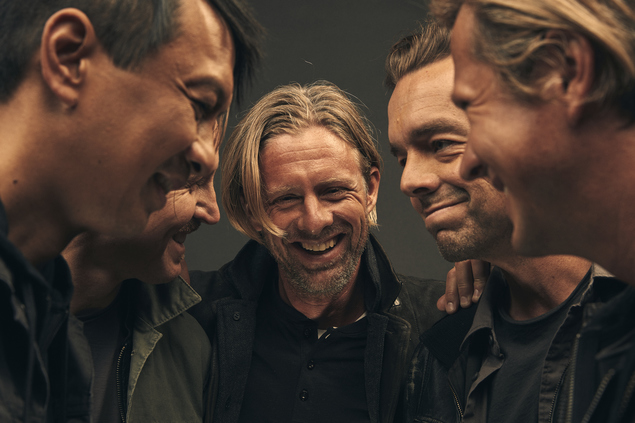 Then I started having the songs just come to me and sneaking into the studio late at night, going back in and just recording them for fun. And then I noticed my brother was sneaking into the studio too, and so we started just having fun and pursuing joy. So the whole time we were making this record, we’d say, “It was not a record, it’s not an album. We’re just having fun.”
Then I started having the songs just come to me and sneaking into the studio late at night, going back in and just recording them for fun. And then I noticed my brother was sneaking into the studio too, and so we started just having fun and pursuing joy. So the whole time we were making this record, we’d say, “It was not a record, it’s not an album. We’re just having fun.”
What I want people to take away from this album: first of all, I want it to bring them joy. I want it to open the doors and the windows of the soul to a story larger than themselves. I want it to remind them that deep below their fears and their subsequent hatred of whatever they’re afraid of, that beneath all of that, a humanity runs as a river among all of us, and that Love Himself has spoken us into being. And out of that love is our native tongue, that fear and hatred are not our native tongue.
I would love to see a church rise up and begin to speak compassionately, not only to the aching watching world, but to ourselves and each other.
Probably one of the more wilder stories that I’ve ever experienced was this one this one time, I was playing a show in Florida. It was a solo show, which means I don’t have a set list. People pass up pieces of paper on the front of the stage, and I just kind of sit through them during the show. And it’s kind of a Choose Your Own Adventure where the people in the audience make the set list.
In the middle of the show, this paper airplane comes, and I catch it right out from my guitar. I open it up and it says, “Can you please play ‘Inheritance?’ It was the song that we used for our wedding.” As I look at the people who threw that paper airplane, I’m like, “Of course we have to play that next.”
I started playing it, and I’m thinking, I don’t think this is the right key.” And I hear his voice in the audience say, “Jon! It’s in G!”
And I say, “Who is that?”
This voice says, “It’s Josh!”
And I said, “Josh do you know this song?”
And he says, “Yes!”
All of a sudden, he starts to rise out of the audience. He, like, floated up to the stage. I don’t know if he crowd surfed or what, but he was like an apparition. Suddenly he’s standing up next to me, and he’s this kid. I’m like, “Okay, Josh, would you mind playing this song for me?” And I thought he was just going to play the guitar part and I would sing. And then he grabs a mic and starts singing. And I’m like, This is amazing. I’m just sitting off to the side of the stage watching this whole thing unfold and he’s getting the crowd into it and he’s just owning the moment. I’m just so impressed with this kid. And so I had him up. I’m like, “Well, you can’t leave the stage now.” I had a second guitar so I just had him play with me the whole night.
I was talking with him backstage. We ended up FaceTime his relatives—they were back in Central America. He had learned how to speak English with Switchfoot songs. Obviously he knew all his songs better than I did. But those are the moments where you realize how little I did and how fingerprints much bigger than mine [were] on that kind of story.
I’ve been so humbled to hear thousands of these stories. And the humbling element is that you realize after you hear a few of them that you have nothing to do with the story. All you did was write a song contemplating the meaning of life at three in the morning and try your best to record it, and somehow it was used for something much bigger than your ambition.
I still see him every now and then. He’s this incredible kid, amazing musician. And I love moments like that. That’s kind of why I play music.
I used to want to see perfection. That was a goal. I would make music in my bedroom with a 4-track, and I would spend all day on it and try and get everything in tune and in time. Then I’d play it live, and I hated it because the strings would break things would go out of tune. Somewhere along the way, I learned to embrace the chaos where you realize the moment that is happening now has already passed. Your string broke, so that’s done. Let’s move on. “How do you achieve perfection?” became “How do you achieve connection?” Connecting with people is so much better than perfection because people aren’t perfect. None of us are perfect. I can’t relate to perfection, but I can connect with flaws. I can connect with things that go wrong.
“Connecting with people is so much better than perfection because people aren’t perfect.” – Jon Foreman
Creating Music That Reaches Everyone
I feel like the mantle of Christian music is an incredible opportunity to explore that 21st century mindset of what it means to be a believer. And I feel like the fact that we want to delineate between Jay-Z and Bob Dylan and Bob Marley and Johnny Cash and whoever, and then put in a different pile of something else that has some sort of religious belief is very curious. I feel like it reveals a lot about the way American minds view their faith.
My hope is that we could be a church that would be reaching out beyond ourselves. Certainly I understand the purpose of worship and corporate worship, and I love so many songs that bring people together in the obvious form of adoring Christ at church all of these things.
“My hope is that we could be a church that would be reaching out beyond ourselves.” – Jon Foreman
The difference is that when we have that delineation in our minds between the sacred and secular, we effectively are drawing a line between our community. And that has a dramatic implication on the way that we treat people.
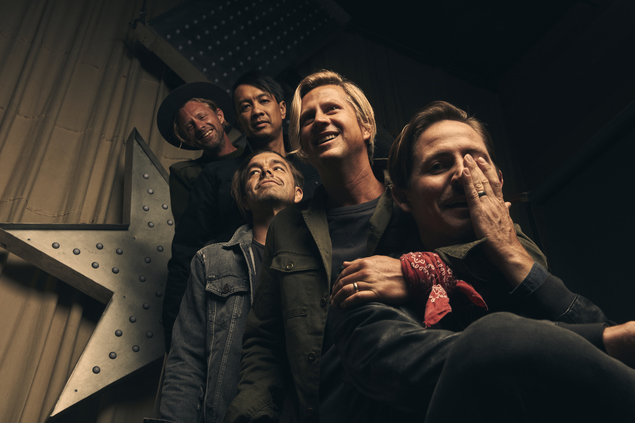 Christ came so that none would perish, but that all would find salvation. If that is His hope, then in the words of von Balthasar, “Dare we hope that all men might be saved.” Dare we hope. You know, dare we be on the side of Christ in rooting for these people, loving these people, reaching out to these people.
Christ came so that none would perish, but that all would find salvation. If that is His hope, then in the words of von Balthasar, “Dare we hope that all men might be saved.” Dare we hope. You know, dare we be on the side of Christ in rooting for these people, loving these people, reaching out to these people.
I feel like the delineation in our minds, it seems like a subtle difference but it is a dramatic thing.
I do it all the time. We all have these unknowing prejudices where we prejudge something. But the more I travel around the world, the more I realize that the love that God has for what He’s made. We were just in Bangladesh, and you could not find a more different culture than Southern California. But you see it in the eyes of the kids and the adults. And you realize, “I’ve recognized that before. That is the spark of The Maker. That is the image of God right there. I’ve seen that before.”
Our purpose in calling as a band is to attempt to speak to both sides of that, and to acknowledge that whether we’re playing music in a church or a bar or at a bar mitzvah or coffee shop or wherever, we are all hurting people in need of the self sacrificial love of our Maker.
Narrator: To learn more Switchfoot’s new album Native Tongue, go to switchfoot.com. [embedded content]
Narrator: Next time on the Jesus Calling Podcast, we speak with beloved teacher and writer Margaret Feinberg. In her new book Taste and See: Discovering God Among Butchers, Bakers, and Fresh Food Makers, Margaret shares a culinary exploration of Scripture that profoundly changed the way she viewed gatherings around food, forever.
Margaret Feinberg: I went 410 feet down into a salt mine, fished in the Galilee, brought in an olive harvest in Croatia, graduated with a certificate in Steakology 101 from a Texas butcher who calls himself “the meat apostle.” And I stand in awe of the richness and the depth of God’s word and what comes alive when we begin to studying these foods on a granular level.
